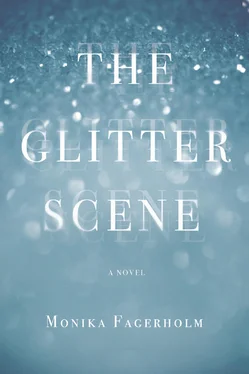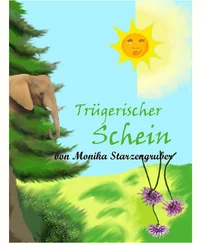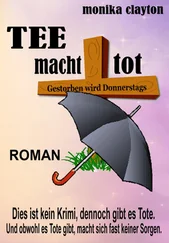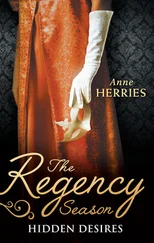Accordingly, this is when his daughter Maj-Gun quickly jumps in and states that bit about the grove which, despite everything, is so lush in the summer of course in any case. And her father then, when he hears that, how he comes to his senses again and relaxes and places his warm pastor’s hand on his daughter’s hand on the table.
And THAT IS HOW Maj-Gun, after a period of absence, introduces herself to her father, with that line, not as she had imagined in the church during the service. Though before she has the chance to say anything else here in this situation her father will personally say something, wink with one eye and say softly, just to her: “Came too late? Maybe you took the wrong bus?”
A warm smile spreads over his daughter’s face then, and her father’s warm hand in hers, and her warm hand in his—and hands, in general, everyone’s hands will, for a little while, become warm. Even Tom Maalamaa’s paw that is pounding his sister’s back, exaggeratedly brotherly. “Hey, Sis,” with a painful pluckiness that rhymes poorly with his impeccable exterior. As if he, for one moment, when he sees her again after a long time, finds himself in a childhood where he and Maj-Gun never were, either alone or together, for the same age exists in him as in her and that was always what united them—and divided them—actually.
But Tom, there at the reception, otherwise brown like a gingersnap next to his fiancée, white and pale in the face, in the middle of all the warmth, she is beaming as well. One of those, a few seconds, a complete moment, in reality. “Ahem”: Tom Maalamaa who is going to clear his throat and get up and with his future wife in his wake will walk up to the table where a photograph of Liz Maalamaa is standing next to a tea light and a large pile of telegrams and addresses. Which he consequently starts reading aloud with his fiancée’s help: she, next to him, hands the addresses to him one after the other and then she carefully arranges the read ones in a perfect fan on the table. Susette Packlén, a glorious light around her. Those eyes, like globes, a whole world, silk velvet rag scraps —so filled with life and meaning now. The engagement will be made official later in the spring in connection with one, in a line of her brother’s many appointments, that he is also casually sitting and talking about at the table with relatives from the husband’s side of the family without it sounding like boasting.
And what are you supposed to think then, about Susette Packlén? Love. Susette and love. My life . That there had ever been another lover. The Boy in the woods. A newsstand toppler? But that is just absurd.
A long, LONG time later, many years, hundreds from this point in time, Susette Maalamaa like Maj-Gun Maalamaa will, who otherwise will not have any contact at all over the years, explain it like this:
“Do you know what it was like with him, Bengt? Like being in a wood. Getting lost. I didn’t understand what he was saying. Like with Janos, the Pole, or the Lithuanian, which he actually was. From the strawberry fields. Just went on and went on, I didn’t understand a thing. That’s how it was with that.”
Mrs. Maalamaa, which is what becomes of her later, for many years. Susette Packlén from the District who cleaned for Solveig at Four Mops and a Dustpan, got a white cat for herself for a while, and walked around and did not get anywhere in the District.
Susette at the window . It is high there, above everything. A window in a room in her own house in the outskirts of the city; there are parts of cities in the world, does not matter in which city, these neighborhoods, exclusive outskirts, by water if there is water, they all look the same. Tom Maalamaa with family will come to live in neighborhoods like these in the cities where the international organizations he works for have their headquarters.
Tom Maalamaa. You will be able to read about him in the paper sometimes, hear him speak from well-paid podiums, see him in pictures. “Improving the world”—unpretentiousness. “The wife in the background.” Can be recognized by her large eyes. Cute . Three children. Karl-Olof, Mikael, and Elizabeth Ida. No pets due to the allergies in the family. The aupairgirl, Gertrude.
“This,” Susette will suddenly say at the window in her home in the living room, second floor, view over a bay, “reminds me of Portugal. Death in the hands. I had it then as well.”
•
But STOP, here now, stop. Right here, NOW, still, the inevitable. The cemetery, before the memorial when Liz Maalamaa receives many dear greetings filled with memories from the past, before everything: as if one wanted, through these jumps in time forward backward, to get away from the unavoidable in front of you. The GRAVE. The coffin with the aunt being lowered down, roses falling on the coffin in the hole before the wooden lid is placed on top and wreaths with flowers rain over it.
Two roses, no more. From both godchildren, Maj-Gun’s, Tom’s. Maj-Gun’s a small, simple pink one that the Manager helped her pick out at the flower shop in the town center where they had gone together in public that last day they had been together. The rose, which had already been standing in a vase in fresh, nourishing, lukewarm water, a few delicate slits with the knife in the stem, on the counter in the kitchen in the Manager’s apartment during what had been the last night.
And Tom’s rose: dazzling, huge like a sunflower, dark red, becoming in the way it matches his cashmere scarf. Pjutt , drops it, an unnatural gesture, which is exactly why it cannot, with that movement, avoid etching itself onto the retinas of the audience.
But it does not help. My child my child, I am going to make you so happy . The dead one, Aunt Maalamaa, gulping on a ship with her goddaughter a long time ago, a will. It has not been fun, as it will turn out.
Because Maj-Gun Maalamaa inherits everything, the entire estate—“the whole kingdom,” including a winter home in Portugal. In her brother Tom Maalamaa’s face who had the entire coffinhell to deal with personally in Portugal, which he, in the moment he grows pale beneath his sunburn, hisses at the lawyer’s office when the will is opened and read aloud which, according to the wishes of the deceased, takes place first thing after the funeral—these, the aunt’s final requests, which have been quite a few and had mostly to do with the funeral and the shape of it, meticulous instructions, right down to the china that should be used during the reception, a fine china , were neatly written down in a notebook in the nightstand drawer next to the aunt’s bed in Portugal. And Tom and Susette have followed these to a T, with the exception of the seating of the family doctor because, in regard to him, there has in Liz Maalamaa’s notes not been a single mention.
Coffinhell. Tom Maalamaa has given the show away, but only for a few moments, then he pulls his act together again—and forever.
Maj-Gun gets everything, right in front of the noses of the husband’s side of the family too, who have been putting on a show for the aunt since she became a widow. Dick and Duck, amusing maybe, because against the good advice of his relatives’ and his family’s lawyers her husband had refused to sign a prenuptial agreement so everything he owned went to his wife. Properties, stocks, and what in inheritance language is called “loose money,” cash in other words.
The significance of this inheritance for Maj-Gun should not be underestimated. Not due to any malicious pleasure in the presence of the relatives or her brother who had hidden his greediness well with his smooth walking and talking: things like this pass, are evened out. And besides, those differences of opinion they had during childhood, they really were not that bad: mutual frustration and irritation as said, like dogs and cats , which Mama Inga-Britta always used to say.
Читать дальше











